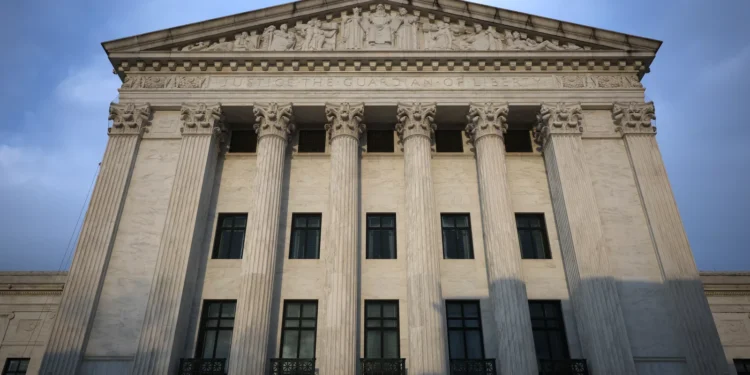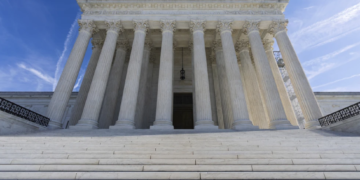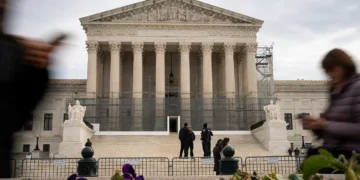July 28, 2025 Story by: Publisher
Supreme Court Justice Clarence Thomas has granted Alabama’s extension to file opening papers in the appeal of a lower court decision invalidating the state’s latest congressional map. Application 25A110 was filed in the United States District Court for the Northern District of Alabama. Jurisdiction statement are now due in September 4 rather than August 5.
According to a July 23 filing submitted by Alabama Solicitor General Edmund G. LaCour Jr., the state requested additional time to prepare initial submissions in the consolidated cases of Singleton v. Allen and Milligan v. Allen, which center on the question of whether Alabama’s redrawn congressional map continues to dilute the voting strength of Black voters in violation of Section 2 of the Voting Rights Act of 1965.
Justice Thomas, who handles emergency and procedural matters for the Eleventh Circuit granted the motion, extending Alabama’s deadline to file opening papers in the redistricting appeal.
The order allows the state an additional 30 days to prepare arguments in what could become another consequential case involving the Voting Rights Act and racial gerrymandering.
Background: The Ongoing Legal Fight Over Alabama’s Congressional Map
These federal issues arose from a lengthy legal challenge to Alabama’s congressional maps. In 2022, a three-judge federal court struck down Alabama’s 2021 map, ruling that it violated Section 2 of the Voting Rights Act by diluting Black voting power.
The court noted that Black Alabamians make up about 27% of the state’s population but under the old plan held only one of seven U.S. House seats (roughly 14% of representation). With voting patterns sharply polarized by race in Alabama, the court concluded that Black voters could not elect their preferred candidates in a second district under the 2021 plan.
The court ordered the state to draw a map with two districts in which Black voters would have a realistic opportunity to elect their chosen candidates.
The U.S. Supreme Court upheld that ruling.
In Allen v. Milligan, 599 U.S., the Court agreed that plaintiffs were likely to prevail on their Section 2 claim against Alabama’s 2021 map. The Court’s 5-4 decision effectively mandated creation of a second majority-Black district.
In response, the Alabama legislature approved a new map in 2023 with one majority-Black district and a second district that was roughly 40% Black. The federal panel, however, still found that map intentionally discriminated against Black voters for failing to produce two Black-opportunity districts as required by law.
After trial, the three-judge court appointed a special master who drew a remedial map. That map shifted boundaries so that Alabama’s 2nd and 7th congressional districts are majority-Black or nearly so.
It was used in the 2024 elections, and the result was historic: for the first time, Alabama elected two Black members to the U.S. House simultaneously. Republicans won five other seats, as in prior years.
In its 2025 opinion, the panel explicitly found the 2023 legislative map was the product of racial intent, saying the Legislature had “purposefully refused” to comply with prior court orders.
Following that ruling, Alabama’s legislature passed a new map in mid-2023 that still failed to create a second majority-Black district. Once again, the same lower court panel struck down the map for noncompliance and appointed a special master to redraw the districts. The court’s remedial map was used in the 2024 elections, resulting in two Black-opportunity districts for the first time in Alabama’s modern history.
The state’s new appeal seeks to challenge that lower court’s authority and interpretation of the Supreme Court’s prior decision, essentially arguing that it was forced to comply with a standard that undermines traditional redistricting principles such as compactness, respect for political subdivisions, and incumbent protection.
A three‑judge federal panel will hear arguments on Tuesday, July 29, 2025, to decide whether Alabama should be reinstated under the Voting Rights Act’s preclearance requirement—the provision that required federal approval before certain jurisdictions can change their election laws.
Although the Supreme Court nullified the coverage formula in 2013, the so‑called “bail-in” mechanism allows courts to impose preclearance on states found to have engaged in intentional discrimination.
Sources: Supreme Court.gov – Docket No. 25A110 – Motion for Extension of Time / Supreme Court.gov

















